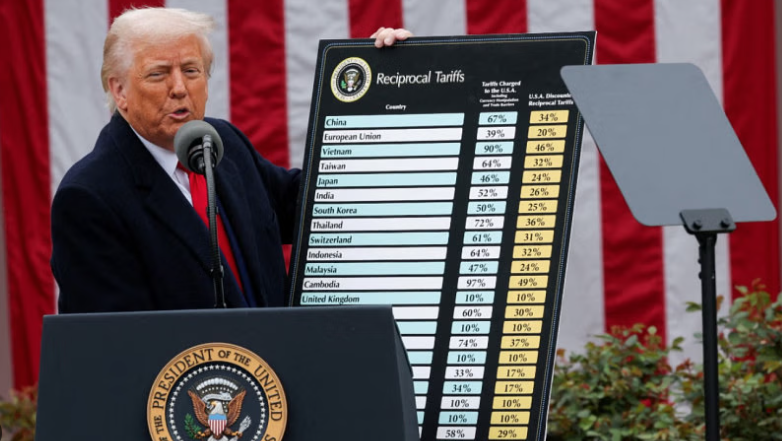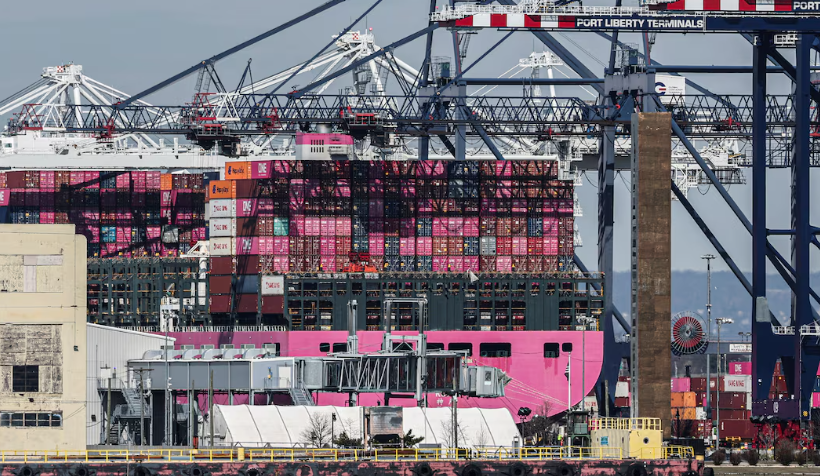WORLD NEWS

President Donald Trump has announced sweeping tariffs on imported goods, setting the stage for a potential global trade war. The new tariffs, which include a 10% baseline duty on all imports and higher rates on specific countries, have raised alarms across the globe. Experts are predicting a sharp economic downturn and higher prices for American consumers, particularly on products ranging from electronics to apparel.
The announcement sent shockwaves through financial markets, triggering a significant sell-off in stocks. The Dow Jones Industrial Average dropped nearly 4%, marking its worst day since June 2020. The broader S&P 500 fell nearly 5%, while the tech-heavy Nasdaq suffered a 6% loss. The global economy also took a hit, with the U.S. dollar falling and oil prices dipping sharply. Analysts warn that the tariffs could disrupt supply chains, raise the cost of living, and threaten corporate profitability.
One of the most vocal critics has been Japan, one of the United States’ key trading partners. Prime Minister Shigeru Ishiba condemned the tariffs, calling them a "national crisis" as Japanese banking stocks plummeted. In response, Japan has signaled potential countermeasures, while the European Union and China also warned of retaliation.
The U.S. tariffs come at a critical time, as the global economy struggles with sluggish growth. According to JP Morgan, there is now a 60% chance of a global recession by the end of the year, up from 40% previously. IMF Managing Director Kristalina Georgieva has called on Washington to de-escalate tensions, warning that the tariffs could destabilize the already fragile global economy.
The U.S. government argues that the tariffs are necessary to address unfair trade practices, particularly by China, Japan, South Korea, and the EU, and to protect American manufacturing jobs. Vice President JD Vance defended the tariffs, emphasizing their importance for national security and domestic job creation. However, the move has also alienated key allies, with Canadian Prime Minister Mark Carney accusing the U.S. of abandoning its historic role as a champion of free trade.
The tariffs could drive up prices for everyday goods. For example, an iPhone could see its price nearly double, with consumers facing the prospect of paying up to $2,300 for high-end models. Companies like Nike and Apple have already seen their stock prices tumble in response to the tariff threat, and automakers such as Stellantis have announced layoffs in the U.S.
Trump’s move has sparked widespread debate. Some see it as a necessary step to bring more manufacturing jobs to the U.S. and protect American industry. Others, however, warn that it could backfire, reigniting inflation and causing long-term damage to the economy. With the tariffs set to take effect on April 9, the world is bracing for what could be a prolonged period of trade disruption.
While the White House has signaled that the tariffs are not intended to be permanent, there is significant uncertainty about the administration’s strategy. Trump himself has contradicted his own officials, suggesting that the tariffs may be part of a broader negotiation strategy to extract concessions from other countries.
In the coming weeks, the U.S. will likely face mounting pressure from both allies and adversaries to resolve the situation. As the trade war heats up, the global economy stands on a precipice, uncertain of the full impact of these sweeping trade measures.




